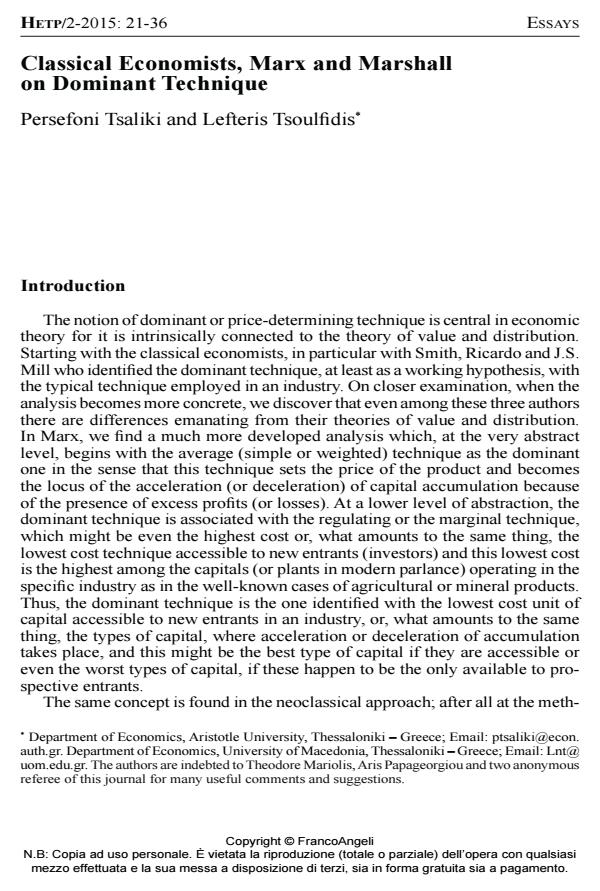Classical Economists, Marx and Marshall on Dominant Technique
Titolo Rivista HISTORY OF ECONOMIC THOUGHT AND POLICY
Autori/Curatori Persefoni Tsaliki, Lefteris Tsoulfidis
Anno di pubblicazione 2015 Fascicolo 2015/2 Lingua Italiano
Numero pagine 16 P. 21-36 Dimensione file 253 KB
DOI 10.3280/SPE2015-002002
Il DOI è il codice a barre della proprietà intellettuale: per saperne di più
clicca qui
Qui sotto puoi vedere in anteprima la prima pagina di questo articolo.
Se questo articolo ti interessa, lo puoi acquistare (e scaricare in formato pdf) seguendo le facili indicazioni per acquistare il download credit. Acquista Download Credits per scaricare questo Articolo in formato PDF

FrancoAngeli è membro della Publishers International Linking Association, Inc (PILA)associazione indipendente e non profit per facilitare (attraverso i servizi tecnologici implementati da CrossRef.org) l’accesso degli studiosi ai contenuti digitali nelle pubblicazioni professionali e scientifiche
The focal point of this paper is the notion of the dominant technique and its treatment in the theories of value and distribution. Our argument is that neither the average nor the minimum cost production are necessarily identified with the dominant technique in an industry. The dominant technique is in fact approximated with the types of capital, where expansion or contraction of accumulation actually takes place, and in this sense, the dominant is perceived as marginal technique used by firms entering (or leaving), and, therefore, expanding (or contracting) industry’s supply. Such a concept is absolutely consistent with the classical theory of value and is at odds with the neoclassical (not necessarily Marshall’s) theory despite of the adoption of marginal analysis.;
Keywords:Dominant technique, market value, representative firm
Jel codes:B10, D40, O30
- Aslanbeigui N. and M. Naples (1997). Scissors or Horizon: Neoclassical Debates about Returns to Scale, Costs, and Long-Run Supply (1926-1942). Southern Economic Journal, 64(2): 517-30.
- Cournot A. (1927[1838]). Researches into the Mathematical Principles of the Theory of Wealth, translated By Nathaniel T. Bacon, New York: Macmillan.
- Garegnani P. (1983). The Classical Theory of Wages and the Role of Demand Schedules in the Determination of Relative Prices. American Economic Review, 73: 309-13.
- Marshall A. (1890[1920]). Principles of Economics. London: MacMillan
- Marx K. (1867[1977]). Capital, Vol. I. New York: International Publisher.
- Marx K. (1894[1977]). Capital, Vol. III. New York: International Publisher.
- Mill J.S. (1848[1976]). Principles of Political Economy. Fairfield New Jersey: Augustus M. Kelley.
- Moudud J., C. Bina and P. Mason (eds.)(2012). Alternative Theories of Competition: Challenges
- to Orthodoxy. Routledge, London. Mueller D.C. (1990). The Dynamics of Company Profits: An International Comparison.
- Cambridge: Cambridge University Press.
- Prendergast R. (1992). Increasing Returns and Competitive Equilibrium. The Content and Development of Marshall’s Theory. Cambridge Journal of Economics, 16: 447-62.
- Ricardo D. (1821[1951]). Principles of Political Economy and Taxation. Cambridge: Cambridge University Press.
- Salter W. (1966). Productivity and Technical Change. Cambridge: Cambridge University Press.
- Schohl F. (1999). The Paradoxical Fate of the Representative Firm. Journal of the History of Economic Thought, 21: 65-80.
- Shaikh, A. (2016) Capitalism: Competition, Conflict, Crises. New York: Oxford University Press (forthcoming).
- Smith A. (1776). The Wealth of Nations, New York: The Modern Library.
- Stigler G. (1969). The Organization of Industry. Homewood, Ill: Irwin.
- Tsoulfidis L. (2010). Competing Schools of Economic Thought. Heidelberg: Springer.
- Tsoulfidis L. and Tsaliki P. (2012). Classical Competition and Regulating Capital: Theory and Empirical Evidence. In Moudud, Bina and Mason (eds.)(2012).
- Classical Political Economics and Modern Capitalism Lefteris Tsoulfidis, Persefoni Tsaliki, pp.285 (ISBN:978-3-030-17966-3)
- Dynamic linkages between real exchange rates and real unit labour costs: evidence from 18 economies Thanos Poulakis, Persefoni Tsaliki, in International Review of Applied Economics /2023 pp.607
DOI: 10.1080/02692171.2023.2240257 - Classical Political Economics and Modern Capitalism Lefteris Tsoulfidis, Persefoni Tsaliki, pp.197 (ISBN:978-3-030-17966-3)
Persefoni Tsaliki, Lefteris Tsoulfidis, Classical Economists, Marx and Marshall on Dominant Technique in "HISTORY OF ECONOMIC THOUGHT AND POLICY" 2/2015, pp 21-36, DOI: 10.3280/SPE2015-002002